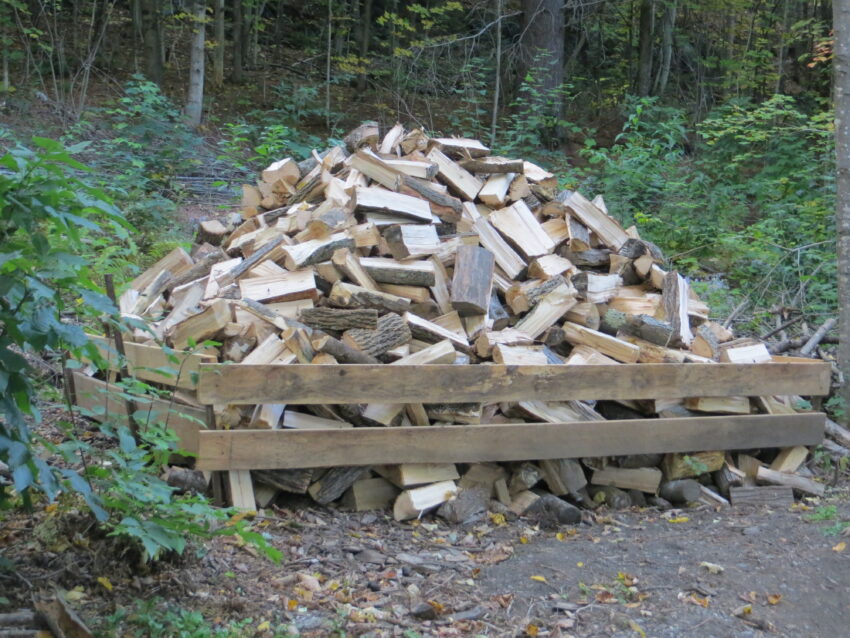I close the gate to the pasture after letting the sheep in and push hard on the metal gate to the garden. Long tendrils curl away from the pumpkins, small yellow bulbs swell but don’t really resemble a Jack O’lantern yet. Kale plants, eternally hardy, faithfully push new leaves out for me to harvest. The above-ground greenery of the potatoes is tired and returns to the earth, brown and matted, hiding what is happening below ground where the magic lives. We’ll leave potatoes tucked into the dirt until it is cold and then use our spading forks, turn over the rich, brown soil and reveal gifts; potatoes in jackets of fall colors. I toss them as I go into a metal bucket. When full, I wash the damp earth off and place them in our wooden bin, like precious Christmas ornaments, in layers of shavings. This winter we’ll roast, mash or boil them for evening meals and we’ll taste summer once again.
The garden is weary.
Midday I walk the dogs to the bee hives with Julie, my bassonist/bee-keeping friend. We don our bee garb, light the smoker, shut off the electric fencing and check on our hives. Outside, new bees are weaving around taking their first GPS flight, orienting themselves to home. In the tilted afternoon sunshine, we stand and watch them come and go like a busy highway. It reminds me of a cartoon, “The Jetsons,” that I watched when I was a kid: spaceships coming and going.
Racks are full of nectar and capped honey. I pull my glove off and use my bare finger to swipe a taste of the honey and comb. We won’t be taking any honey from the hives this year as a new hive needs all of its hard-earned resources to eat come winter. Julie and I talk about wrapping my hives in tar paper, the rough black offering solar warmth in the cold months ahead. The bees will hunker down in the hive gathering around the Queen to keep her warm. Every hive is self contained, every bee completely committed to the survival of its Queen and community. My job is to protect them from cold winds, condensation and curious mice.
I stand still for a moment and can hear the whine of our chainsaw as Paul and Jeff cut up a tree for firewood. There is the distinct clunk as chunks of wood are tossed into the back of our truck. They will haul up as much as they can, carry and stack the blocks near our wood splitter where they will wait for someone to split and stack them. We are always a year ahead in wood so that one side of our shed offers this year’s heat, the other will dry for another season. We stack more wood next to our chimney for our fireplace. And under our bedroom window is another wood rack which is now full: above it hangs our summer garlic harvest drying as it swings in the soft breezes. It still wears a rough beard on its chin and if the window is open at night we can sometimes catch the garlic scent.
We have already had periodic fires in the woodstove. The sun is no longer strong enough to heat the house during the day so we split kindling and feed it as an offering. In the night we reach down and haul our wool blanket up around our chin, nesting in sheets of flannel.
At dusk I sit on the steps to the chicken coop and feel like something is missing. It takes me a moment but as I take in the silence I realize that I’m struggling to hear the Hermit Thrush calling from the deep woods, but there is no sound. The plain brown birds with the big song arrive and leave without announcement or fanfare. The space that is left will be soon filled by the roar of north winds coming down the mountain.
Foliage brings enormous buses full of people wearing plastic name tags around their necks and I am irritated but grateful. I feel excited as I watch leaves blow to the ground and realize that the celebration is one of an ending. Of death. The leaves turn color in response to change and it signals the end of their life cycle. When limbs are bare, our party is also over and we slowly descend into winter, hoping that we, too, are prepared.
Living with five seasons (think mud) we have long ago become acclimated to change. Like with squirrels, our instincts tell us to prepare for what is next. We spend much of our summer months in this preparation for winter, and not just stacking fuel and gathering food, but preparing for the quiet, the cold, the isolation.
Our winters offer the opportunity to reflect and restore. The early darkness turns off lights to just one more project needing to be done. We gather around the table and eat from jars of food that we put up in the summer months. Our wool socks steam as we press feet against the belly of the woodstove. We dust off books that we love. We go to bed early and read.
The time has come to slow down.
This winter, like the bees, I will huddle in my hive and hope that those who love me will surround and protect me from the elements. I will find a good book and work to accept this cycle. I will not just revel in the green but celebrate the quiet ending of the white.
